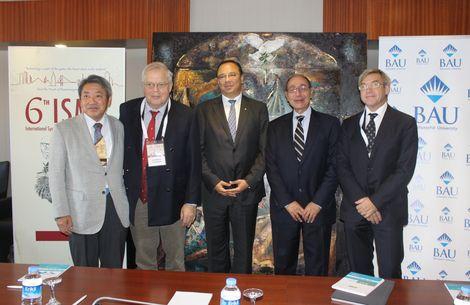At the 6th International Symposium on Microsurgical Anatomy (ISMA) organized by the BAU School of Medicine, it was stated that brain surgery is one of the most rapidly developing fields of science, and Turkey's contribution to world neurosurgery in terms of publication numbers is ranked in the top 6-10 countries. The congress was chaired by the Dean of the BAU School of Medicine, Prof. Dr. Türker Kılıç, and the honorary presidency was held by Prof. Dr. Erdener Timurkaynak from the Neurosurgery Department of Ufuk University School of Medicine.
The 6th ISMA Congress, which brought together authorities in various fields of brain surgery, including "Rhoton Camiası" who studied under Prof. Dr. Albert Rhoton, known as the "father" of modern microsurgical anatomy, discussed important developments and new techniques in brain tumor surgery throughout the congress. At a press conference held during the congress, world-renowned brain surgeons shared their current knowledge about important developments and new techniques in brain tumor surgery that were discussed during the congress.
The press conference held yesterday during the congress was attended by Prof. Dr. Ossama Al-Mefty, Director of the Cranial Base Surgery Unit at Harvard Medical School's Brigham and Women's Hospital, Prof. Dr. Johannes Schramm, Head of the Neurosurgery Department at the University of Bonn School of Medicine, Prof. Dr. Toshio Matsushima, Head of the Neurosurgery Department at Saga University in Japan, Prof. Dr. Tiit Mathiesen, Head of the Neurosurgery Department at Karolinska Hospital in Sweden, and the congress chairman, Prof. Dr. Türker Kılıç of the BAU School of Medicine.
Turkish Neurosurgeons are the Physicians Who Have Contributed the Most to World Science
Speaking at a press conference, Professor Dr. Türker Kılıç highlighted the significant impact of digital technology and brain and tumor biology on the development of brain surgery, which are among the fastest-growing scientific fields worldwide. Professor Dr. Kılıç reminded attendees that the world's leading brain surgeons come from the top five countries in the world in terms of brain surgery, and emphasized that Turkey is ranked between 6th and 10th in terms of the number of publications in the field of brain surgery worldwide.
Considering that Turkey has been ranked in the top 17-20 in terms of economic power in the past 20 years, Professor Dr. Kılıç noted that brain and nerve surgery is ahead of our economic power, and expressed that brain surgeons in Turkey make the most contributions to the world of science. Professor Dr. Kılıç explained that Turkey has introduced many clinical innovations in brain surgery thanks to the developmental impact of global scientific advancements, particularly in the treatment of brain diseases. He said, "Recent advances in molecular biology and genetics have led to the understanding of personalized treatment. We have come to the point where not only every patient, but also every tumor is a unique organism. Therefore, it is not enough to customize the surgery anatomically, but it is also necessary to customize the treatment biologically for the tumor. We believe that clinical applications in this field will soon be used in the treatment of brain tumors and pituitary adenomas."
"Brain Tumor Banks" to Serve New Drugs
Prof. Dr. Türker Kılıç, stating that brain tumor banks are needed to develop personalized treatments for brain tumors, emphasized that Turkey has one of the richest tissue banks in the world in this regard. He continued by saying, "Through these banks, genetic analysis and molecular characterization of the tumor tissue obtained during surgery can be performed, and research that can be applied clinically regarding drug treatments that may be suitable can be conducted. Brain tumor banks allow the accumulation of diseased brain tissue for the purpose of generating knowledge in this field and keeping it ready for experimental use."
Harvard Medical School Brigham and Women's Hospital Skull Base Surgery Unit Director, Prof. Dr. Ossama Al-Mefty, who participated in the press conference, stated that significant progress has been made in the treatment of brain tumors in recent years and said, "We need new surgeon-scientists to better understand the language of the tumor."
"Drug Treatments That Shrink Tumors Open Up a New Era."
Prof. Dr. Johannes Schramm, the head of the Department of Neurosurgery at the University of Bonn Medical Faculty, stated that they are increasingly using drugs in the treatment of brain tumors. Prof. Dr. Schramm said, "Drugs, especially those that play an important role in shrinking the tumor, have opened up a new era in the treatment of pituitary adenomas."
Prof. Dr. Schramm explained that in epilepsy surgery, just like in the treatment of Parkinson's disease, epileptic seizures can be prevented thanks to a small electrode implanted in the patient. Summarizing the developments of the last 40 years, he added that the mortality rate has decreased from the 10s to below 1% in many diseases.
Prof. Dr. Tiit Mathiesen, the head of the Department of Neurosurgery at Karolinska Hospital in Sweden who participated in the press conference, stated that they are seeking new ways through technological opportunities to better understand the tumor biologically.

